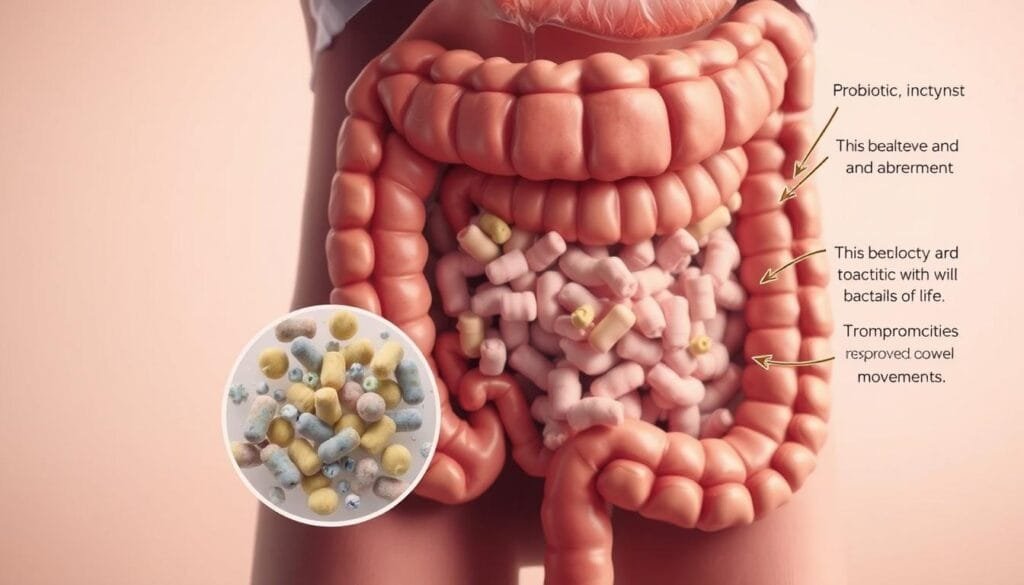Currently Empty: RM0.00
Surprising fact: recent studies estimate that trillions of microbes live in the human gut, and changes in those communities can show measurable shifts in digestion within weeks.
Wellness Concept welcomes questions on digestive health and offers Malaysia-based support. They explain how live cultures such as Lactobacillus and Bifidobacterium may change bowel frequency and consistency for some people.
Research shows benefits vary by strain, diet, hydration, and the existing microbiome. Quality and viability matter because supplements and fermented foods differ in live cultures and survivability through the system.
The guide previews normal short-term changes, realistic results, and safety tips. For personalized help, WhatsApp +60123822655 during business hours: Mon–Fri 9:30 am–6:30 pm, Sat 10 am–5 pm.
Key Takeaways
- Live microbes can influence digestion, but effects differ by strain and person.
- Fermented foods and well-made supplements may support a healthy microbiome.
- Research shows benefits, yet quality and survivability are crucial for results.
- Expect modest, gradual changes; lifestyle and diet shape outcomes.
- Wellness Concept offers local guidance in Malaysia via WhatsApp during listed hours.
Understanding Probiotics, Your Microbiome, and Gut Health
Probiotics are beneficial bacteria and yeasts that can enrich the microbiome throughout the body when taken in adequate amounts.
The gut hosts trillions of microbes. Balancing helpful bacteria supports digestion, immune function, and everyday health.
Effective options must be proven strains, remain viable after processing, and survive the digestive tract. Common, studied strains include Lactobacillus (L. acidophilus, L. rhamnosus) and Bifidobacterium (B. longum, B. breve).
- Fermented foods such as yogurt, kefir, kimchi, and sauerkraut often provide live cultures; look for “live and active cultures” on labels.
- Over-the-counter products vary in strain type, CFU count, and delivery format; viability matters for real benefit.
- Choosing reputable brands and reducing heavy processing of foods improves the chance that microbes reach the gut intact.
| Source | Common Strains | Notes |
|---|---|---|
| Yogurt / Kefir | Lactobacillus spp. | Check for “live and active cultures” |
| Supplements (OTC) | Lactobacillus, Bifidobacterium | Look for strain ID and CFU at expiry |
| Fermented Vegetables | Mixed lactic bacteria | Best when minimally processed |
If readers want tailored product advice in Malaysia, they can message Wellness Concept on WhatsApp at +60123822655 during Mon–Fri 9:30 am–6:30 pm and Sat 10 am–5 pm.
How Probiotics Influence Digestion and Bowel Movements
Many people notice changes in digestion when they add live cultures to meals or try a supplement.
Balancing gut bacteria: Lactobacillus and Bifidobacterium’s role in stool formation
Lactobacillus and Bifidobacterium are well studied for digestive support. These bacteria can strengthen the intestinal barrier and limit growth of harmful microbes.
As balance improves, many people report smoother, more comfortable bowel movements and fewer episodes of hard passes or urgency.
Transit time, stool frequency, and consistency: what research shows at present
Clinical research finds some strains shorten transit time and increase stool frequency and weight. Results vary by strain and person, so effects are not guaranteed.
Evidence also shows reduced diarrhea after antibiotics and relief for some irritable bowel syndrome symptoms like gas and pain.
Dietary sources vs. probiotic supplements: yogurt, kefir, kimchi, and more

Fermented foods such as yogurt, kefir, kimchi, and sauerkraut give natural live cultures. Probiotic supplements offer measured doses and targeted probiotic strains when labels list strain IDs and CFU counts.
| Source | Typical Benefit | Notes |
|---|---|---|
| Yogurt / Kefir | Daily live cultures | Check “live and active cultures” on labels |
| Kimchi / Sauerkraut | Varied lactic bacteria | Best when unpasteurized |
| Targeted Supplements | Strain-specific results | Look for strain ID and expiry CFU |
For help choosing foods or a product that fits goals in Malaysia, Wellness Concept can be reached on WhatsApp at +60123822655 (Mon–Fri 9:30 am–6:30 pm; Sat 10 am–5 pm).
Do probiotics affect your stool? What normal changes to expect
Small changes in gut microbes can show up quickly as shifts in bowel habits. Early signs are often mild and temporary.
Possible outcomes: relief from constipation, softer stools, or reduced diarrhea in IBS
Probiotics may increase stool frequency and soften matter for some people. They also help reduce diarrhea, including cases after antibiotics.
People with IBS often report less abdominal pain and steadier stool form. Results depend on strain, dose, and diet.
Short-term effects to monitor: gas, bloating, and mild abdominal discomfort
Initial symptoms can include gas, bloating, mild cramps, or loose stools. These often ease after a few days or weeks as the gut adapts.
- Start with a low dose and increase slowly to reduce side effects.
- Keep fluids and fibre steady; fermented foods can complement supplements.
- If symptoms worsen, pause or try a different strain and seek advice.
| Outcome | Typical Timeframe | Practical Tip |
|---|---|---|
| Softer stools / increased frequency | 1–4 weeks | Begin low, add water and fibre |
| Reduced diarrhea (including antibiotic-related) | 1–3 weeks | Choose studied strains; follow label dose |
| Short-term gas or bloating | Days to 2 weeks | Lower dose temporarily; monitor symptoms |
For personalised guidance on changes and product choices in Malaysia, message Wellness Concept on WhatsApp at +60123822655 (Mon–Fri 9:30 am–6:30 pm; Sat 10 am–5 pm; Sun Closed).
How to take probiotics for better digestion: a step-by-step guide
Start by matching a clear goal to a proven strain so changes in digestion are easier to measure.
Choose targeted strains for your goal
Define the aim — constipation relief, IBS support, or reducing diarrhea. Then pick probiotic strains linked to that outcome. This focus helps people see clearer results.
Start low, go slow: dosing, timing, and storage
Begin with a small dose and increase over several weeks to limit mild side effects. Follow label directions for time of day and storage; some supplements need refrigeration while others stay shelf-stable.

Pair with prebiotics and fermented foods
Combine supplements with prebiotics such as onions, garlic, bananas, and oats. Add fermented foods like yogurt or kimchi to support a healthy gut.
Track symptoms and adjust
Keep a short journal of frequency and form, and note any discomfort. If progress stalls after several weeks, try a different probiotic supplement or consult a professional.
| Goal | Suggested Strains | Start Dose |
|---|---|---|
| Constipation | Bifidobacterium longum, L. plantarum | Low, then increase in 2–4 weeks |
| IBS symptom relief | L. rhamnosus, multi-strain blends | Follow studied label doses |
| Reduce diarrhea | S. boulardii, L. acidophilus | Use as directed; check quality marks |
Need help selecting strains, dosing, or storage? WhatsApp Wellness Concept at +60123822655. Hours: Mon–Fri 9:30 am–6:30 pm; Sat 10 am–5 pm; Sun Closed (Malaysia).
Safety, risks, and quality: making probiotic supplements work for you
Safety and quality checks are essential before adding a probiotic supplement to a routine. Proper selection and storage cut the chance of unwanted symptoms and protect people with fragile health.
Who should be cautious
People with weakened immune systems, those in the hospital, or patients recovering from surgery face higher risk. Severe acute pancreatitis is a clear contraindication; studies show increased complications in this group.
Common side effects and how to reduce them
Short-term symptoms include gas, bloating, mild cramps, nausea, headaches, and diarrhea. These often ease with a “start low, go slow” strategy and stable dietary fibre and fluids.
- Reduce symptoms: lower the dose, change timing with meals, or switch strains.
- Watch amines and histamine: fermented foods may trigger headaches in sensitive people, and some bacteria produce histamine.
- Scan labels: check for common allergens and lactose if intolerances exist.
Quality checks and storage
Choose verified products that list strain IDs and carry third-party marks like NSF or USP. These certifications improve confidence in content and potency.
Follow storage instructions exactly. Some supplements need refrigeration to keep microbes viable through time. Synbiotics (combined probiotics and prebiotics) can raise gas in some people, so adjust use if symptoms persist.
| Concern | Practical Advice | When to Seek Help |
|---|---|---|
| Immune compromise / hospitalised | Avoid unless a clinician advises | If fever or severe pain develops |
| Gas, bloating, mild diarrhea | Start low, slow dose increase; time with food | If symptoms last beyond 2–3 weeks |
| Product quality & storage | Pick third-party certified products; refrigerate when required | If label claims seem unclear or potency is missing |
If questions remain about safe use, storage, or product checks in Malaysia, message Wellness Concept on WhatsApp at +60123822655 (Mon–Fri 9:30 am–6:30 pm; Sat 10 am–5 pm; Sun Closed).
Conclusion
Note, clear goals, patience, and good-quality products help people find measurable gut improvements.
Probiotics can support gut health by aiding regular bowel habits and easing constipation or diarrhea for some. Results vary by strain, dose, and the existing microbiome.
Quality matters: choose third-party certified products, follow storage advice, and start with a low dose to limit mild symptoms like gas or bloating.
Those with higher risk—immunocompromised or recently hospitalised—should consult a clinician before starting supplements.
For personalised guidance and product help in Malaysia, message Wellness Concept on WhatsApp at +60123822655. Hours: Mon–Fri 9:30 am–6:30 pm; Sat 10 am–5 pm; Sun Closed.
FAQ
What does the wellness concept say about probiotics and bowel changes?
The wellness view explains that beneficial microbes, like Lactobacillus and Bifidobacterium, help support digestion and stool formation by breaking down fibers and producing short-chain fatty acids. When someone adds targeted supplements or eats fermented foods such as yogurt, kefir, or kimchi, they may notice gradual shifts in frequency and consistency as the microbiome rebalances.
How do microbes in the gut influence transit time and stool consistency?
Gut microbes modulate how quickly food moves through the digestive tract and how much water the colon reabsorbs. Certain strains can shorten transit time to ease constipation, while others help firm loose output. Clinical studies show effects vary by strain, dose, and individual microbiome makeup.
Are fermented foods as effective as probiotic supplements for digestion?
Fermented foods deliver live cultures plus nutrients and prebiotic fibers that feed resident microbes. Supplements provide specific strains and doses useful for targeted conditions like irritable bowel syndrome or chronic constipation. Combining both often gives the best support for overall gut balance.
What normal changes should someone expect after starting a supplement or fermented diet?
Common short-term responses include increased gas, mild bloating, or slight changes in bowel regularity as microbes shift. Within days to weeks, many people report softer stools, improved regularity, or fewer diarrhea episodes, especially when dealing with IBS or antibiotic-associated issues.
Can supplements relieve constipation or reduce diarrhea in IBS?
Yes. Specific strains, such as Bifidobacterium infantis for IBS or some Lactobacillus species for constipation, have evidence supporting symptom relief. Results vary, so choosing a product matched to symptoms and tracking responses helps determine benefit.
What short-term side effects should be monitored?
Typical early effects are gas, bloating, and mild abdominal discomfort. These usually resolve within one to four weeks. If symptoms worsen or fever and severe pain develop, the person should stop use and seek medical advice.
How should someone choose strains and dosing for a digestion goal?
Pick strains studied for the specific issue—Bifidobacterium and Lactobacillus for IBS or stool consistency, Saccharomyces boulardii for some diarrheal conditions. Start with a lower dose and increase gradually, following manufacturer guidance or a clinician’s recommendation.
What does "start low, go slow" mean for supplements?
It means beginning with a smaller dose to allow the gut to adapt, then increasing as tolerated. Taking products with food and storing them per label instructions helps stability and reduces side effects.
How can pairing with prebiotics and fermented foods help?
Prebiotics like inulin and resistant starch feed beneficial microbes, enhancing colonization and metabolic activity. Eating a mix of fermented foods and fiber-rich plants supports a diverse ecosystem that promotes steadier digestion and stool patterns.
When should someone track symptoms or switch strains?
Track stool frequency, consistency, gas, bloating, and abdominal pain for at least four weeks. If there’s no improvement or if side effects persist, switching to a different strain or seeking guidance from a gastroenterologist or dietitian is reasonable.
Who should exercise caution before taking supplements?
People with weakened immune systems, those hospitalized, post-surgical patients, and individuals with central venous catheters should consult a clinician first. In those groups, rare but serious infections have occurred with live microbial products.
What common risks or allergens occur with fermented foods and supplements?
Some products contain biogenic amines or histamine, which can trigger reactions in sensitive people. Dairy-based yogurts and kefir may cause reactions in those with milk allergy. Checking labels and choosing low-histamine options helps reduce risk.
How can someone check product quality before buying?
Look for third-party certification, strain-specific labeling, colony-forming unit (CFU) counts at expiry, and storage instructions. Refrigerated products from reputable brands like Culturelle, Align, or kefir and yogurt from trusted dairies often include stability data.
How long does it take to see changes after starting a product or diet?
Mild changes may appear within days, while consistent improvements in bowel habits often take two to eight weeks. Persistent issues beyond this timeframe merit reassessment with a healthcare provider.
Can supplements interact with medications or medical conditions?
Interactions are uncommon but possible. Antimicrobials can reduce probiotic survival, and immunosuppressive therapy raises infection risk. Patients should discuss plans with their prescribing clinician to ensure safety.
Are there reliable ways to measure improvement in gut health?
Practical measures include stool frequency, the Bristol Stool Scale for consistency, reduction in gas or bloating, and improved quality of life scores. More advanced testing of the microbiome exists but is not always necessary for routine care.



